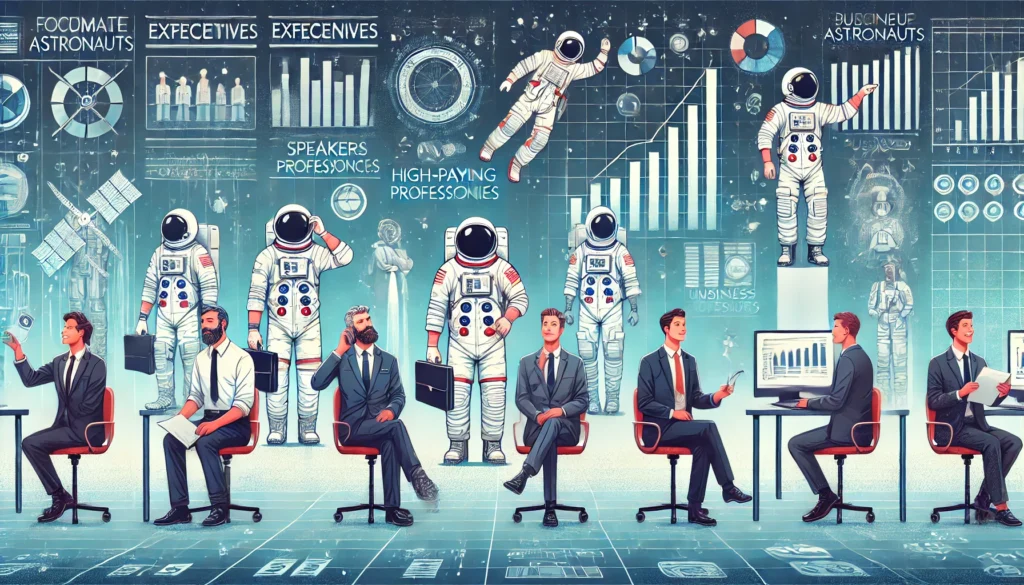Astronauts have always been a source of fascination for people around the world. From the first human spaceflight by Yuri Gagarin in 1961 to the recent SpaceX Crew Dragon mission, astronauts have captured our imaginations and inspired us to reach for the stars. But how much do these brave men and women make for their efforts?
Astronaut salaries can vary widely depending on a number of factors. For example, NASA astronaut salaries are determined by federal government pay scales and can range from $104,898 to $161,141 per year, according to Indeed.com. However, the highest and lowest astronaut salaries in 2023 were reported to be between $159,393 to $212,322 and $97,279 to $147,575, respectively, with an average hourly rate of $20 to $26, according to Payspace Magazine.
Key Takeaways
- Astronaut salaries can vary widely depending on a number of factors.
- NASA astronaut salaries range from $104,898 to $161,141 per year.
- The highest and lowest astronaut salaries in 2023 were reported to be between $159,393 to $212,322 and $97,279 to $147,575, respectively.
How To Become An Astronaut?

Becoming an astronaut is a dream for many people, but it takes a lot of hard work and dedication to achieve. Here are the steps you need to take if you want to become an astronaut:
Step 1: Meet the Basic Requirements
To be considered for an astronaut position, you must meet some basic requirements. You must be a U.S. citizen and have a master’s degree in a STEM field, including engineering, biological science, physical science, computer science, or mathematics, from an accredited institution. You must also have a minimum of three years of related professional experience or at least 1,000 hours of Pilot-In-Command time. A minimum of 850 hours must be in a high-performance jet aircraft.
Step 2: Gain Relevant Experience
To increase your chances of becoming an astronaut, you need to gain relevant experience. This can include working in fields such as engineering, science, or medicine. You can also gain experience by joining the military, particularly the Air Force, Navy, or Marines.
Step 3: Apply to NASA
Once you meet the basic requirements and have gained relevant experience, you can apply to NASA for the astronaut candidate program. The application process is highly competitive, and only a small percentage of applicants are accepted.
Step 4: Complete the Astronaut Candidate Program
If you are accepted into the astronaut candidate program, you will undergo rigorous training to prepare you for spaceflight. This training includes physical fitness, spacecraft systems, and spacewalking.
Step 5: Become an Astronaut
After completing the astronaut candidate program, you will be eligible to be selected for a spaceflight mission. Astronauts are selected based on their skills, experience, and the needs of the mission.
Overall, becoming an astronaut is a challenging and rewarding career path. It takes a lot of hard work and dedication to achieve, but the experience of traveling to space and conducting research is truly out of this world.
Astronaut Salaries Overview

Astronauts are highly skilled professionals who undergo rigorous training and risk their lives to explore space. They are compensated for their work with salaries that vary based on their experience, skills, and job responsibilities.
According to Indeed.com, civilian astronaut salaries at NASA range from $104,898 to $161,141 per year. Salaries for pilots and commanders are the highest, ranging from $159,393 to $212,322. Mission specialists can expect to earn between $97,279 and $147,575 per year, while senior mission specialists can earn between $121,866 and $181,858 per year. On average, the hourly rate for an astronaut at NASA is between $20 and $26.
It is important to note that astronaut salaries are set by federal government pay scales and are subject to change based on budgetary constraints and other factors. Additionally, astronauts may be eligible for various benefits, such as health care and travel allowances, which can add to their overall compensation package.
Despite the risks and challenges involved in becoming an astronaut, many individuals are drawn to this exciting and rewarding career path. While salaries for astronauts may not be as high as those in other professions, the opportunity to explore space and contribute to scientific discovery is a unique and fulfilling experience that few people have the chance to pursue.
Factors Affecting Astronaut Salaries
Experience and Rank
Astronaut salaries are influenced by their experience and rank. NASA, for example, has a pay scale that ranges from GS-11 to GS-14. The salary for a GS-11 astronaut starts at $64,724 per year, while a GS-14 astronaut can earn up to $141,715 annually. Pilots and commanders earn the most, from $159,393 to the highest limit of $212,322, while mission specialists can count on a compensation of $97,279-$147,575. Senior missions specialists will earn more — from $121,866 to $181,858. Experience and rank can also affect the benefits offered to astronauts, such as health care and travel allowances.
Agency and Country
The agency and country an astronaut works for can also affect their salary. NASA astronauts earn a higher salary compared to the Apollo program, with modern astronauts earning between $104,898 and $161,141 per year. In contrast, the European Space Agency (ESA) pays its astronauts an average of €70,000 ($81,000) per year. The Russian space agency, Roscosmos, pays its astronauts around $15,000 per year, while China’s astronauts earn an estimated $37,000 to $44,000 per year.
Mission Duration and Type
The duration and type of mission can also influence an astronaut’s salary. Longer missions, such as those to the International Space Station (ISS), can result in higher pay due to the increased risk and time spent in space. For example, NASA astronauts who stay on the ISS for six months can earn up to $144,566, while those who stay for a year can earn up to $168,799. Additionally, astronauts who participate in high-risk missions, such as spacewalks, may earn additional hazard pay.
Overall, the salary of an astronaut is influenced by a variety of factors, including their experience and rank, the agency and country they work for, and the duration and type of mission they participate in.
NASA Astronaut Earnings

Civilian Astronaut Pay Scale
Civilian astronauts are paid based on the federal government pay scales and their level of academic achievements and experience. According to Indeed, the pay for civilian astronauts ranges from $104,898 to $161,141 per year. Along with their base salary, civilian astronauts receive benefits such as health care, travel, and retirement plans.
Military Astronaut Compensation
Military astronauts are paid based on their rank and years of service. They receive the same base pay as other members of the military, but they also receive flight pay and other special allowances. According to Military.com, military astronauts can earn anywhere from $61,000 to $144,000 per year, depending on their rank and years of service.
It’s worth noting that both civilian and military astronauts are also eligible to receive bonuses for their missions. The amount of the bonus varies depending on the length of the mission and the complexity of the tasks performed. For example, according to Space Crew, pilots and commanders can earn the highest bonuses, ranging from $12,000 to $17,000 per mission. Mission specialists can earn anywhere from $7,500 to $10,000 per mission, while senior mission specialists can earn up to $15,000 per mission.
Overall, the salary and compensation for astronauts may seem high, but it’s important to remember that they undergo rigorous training and perform complex tasks in a high-risk environment. Additionally, the number of astronauts is relatively small, with only a few dozen active astronauts at any given time.
International Astronaut Compensation
ESA Astronaut Salaries
The European Space Agency (ESA) is one of the major space agencies in the world, and it also employs astronauts. The salary of an ESA astronaut varies depending on their experience and qualifications. According to Spacecrew.com, the starting salary for an ESA astronaut is €5,845.25 per month (€70,143 per annum) in France, €5,549.70 per month (€66,588 per annum) in Germany, and £4,534.69 (£54,416 per annum) in the UK. However, this is just a starting scale, and astronauts can earn up to ESA pay grade A4, which pays up to €8,385 per month (€100,620 per annum).
Roscosmos Astronaut Earnings
Roscosmos is the Russian space agency that employs cosmonauts. According to Space.com, the average salary for a cosmonaut is around $12,000 per year. However, this figure is based on data from 2010 and may have changed since then.
Other Space Agencies
There are several other space agencies around the world that employ astronauts, including the Canadian Space Agency, the Japan Aerospace Exploration Agency, and the China National Space Administration. However, information on the salaries of astronauts from these agencies is not readily available.
Private Sector and Commercial Astronauts

While NASA is the most well-known employer of astronauts, there are also private companies that hire astronauts for space missions. These companies include SpaceX, Blue Origin, and Virgin Galactic.
According to Glassdoor, SpaceX pays its astronauts $112,000-$208,000 a year, with the lower figure for new specialists. This is slightly lower than the salary range for NASA civilian astronauts, which ranges from $104,898 to $161,141 per year, according to Indeed.com. However, it’s worth noting that private sector astronauts may also receive additional benefits such as stock options and bonuses.
In addition to private companies, there are also commercial spaceflight companies that offer space tourism experiences for paying customers. These companies include Virgin Galactic and Blue Origin. While these companies do not hire astronauts in the traditional sense, they do employ pilots and other personnel who have experience in the aerospace industry.
Overall, the salaries and benefits for private sector and commercial astronauts may vary depending on the company and the individual’s level of experience. However, it’s clear that there are opportunities for astronauts to work outside of NASA and still earn a competitive salary in the space industry.
Benefits and Allowances
Health and Life Insurance
Astronauts, as federal employees, are eligible for the Federal Employees Health Benefits (FEHB) program. This program offers a range of health insurance plans, including medical, dental, and vision coverage, as well as flexible spending accounts (FSAs) and health savings accounts (HSAs). The government pays a significant portion of the premium costs, with the employee responsible for the remaining balance.
In addition to health insurance, astronauts are also eligible for life insurance through the Federal Employees’ Group Life Insurance (FEGLI) program. This program provides basic life insurance coverage, as well as the option to purchase additional coverage at the employee’s expense.
Retirement Plans
Astronauts are also eligible for retirement benefits through the Federal Employees Retirement System (FERS). This system includes a basic pension plan, as well as the Thrift Savings Plan (TSP), which is a tax-deferred retirement savings plan similar to a 401(k) plan. The government contributes a percentage of the employee’s salary to the TSP, and the employee can also make contributions up to a certain limit.
Education and Training Benefits
Astronauts have access to a range of educational and training benefits, including tuition assistance, professional development opportunities, and on-the-job training. The government may also provide funding for advanced degrees or specialized training programs related to the astronaut’s job duties.
Overall, the benefits and allowances offered to astronauts are competitive with those of other federal employees. While the salary may not be as high as some private-sector jobs, the unique experiences and opportunities offered by a career in space exploration are often considered to be priceless.
Post-Career Opportunities and Earnings

Astronauts have a unique set of skills and experiences that can be leveraged for post-career opportunities. Many astronauts go on to work in the private sector, including aerospace and defense industries. They may also become consultants or speakers, sharing their experiences with others.
According to StarLust, retired astronauts can earn significant incomes from speaking engagements. They can earn up to $50,000 per speech, with some of the most popular speakers earning over $100,000 per engagement. Additionally, retired astronauts may earn royalties from books they have written about their experiences.
Retired astronauts may also be eligible for pensions from NASA. According to Indeed, NASA offers a retirement plan to eligible employees, including astronauts. The retirement plan includes a defined benefit pension plan, which provides a monthly benefit based on the employee’s years of service and salary.
In addition to pensions and speaking engagements, retired astronauts may also receive income from serving on boards of directors or as advisors to companies in the aerospace industry. They may also work as educators, sharing their experiences with students and inspiring the next generation of space explorers.
Overall, astronauts have a unique set of skills and experiences that can lead to post-career opportunities and earnings. Retired astronauts can earn significant incomes from speaking engagements, royalties, and pensions. They may also find opportunities in the private sector, including aerospace and defense industries.
Comparative Analysis with Other Professions
When it comes to comparing astronaut salaries with other professions, it is important to note that astronauts are highly specialized individuals with unique skill sets and qualifications. As such, it can be difficult to find direct comparisons to other professions. However, some professions that require similar levels of education and training can provide a basis for comparison.
One such profession is that of a medical doctor. According to the Bureau of Labor Statistics, the median annual salary for physicians and surgeons was $208,000 as of May 2020. This is significantly higher than the median annual salary for astronauts, which is around $80,000 to $100,000, depending on experience and rank.
Another profession that can be compared to that of an astronaut is that of a pilot. According to the Bureau of Labor Statistics, the median annual salary for airline pilots, copilots, and flight engineers was $147,220 as of May 2020. While this is lower than the median annual salary for physicians and surgeons, it is still higher than the median annual salary for astronauts.
It is important to note, however, that the salaries for pilots and physicians are based on a different set of skills and qualifications than that of an astronaut. Additionally, astronauts often receive other forms of compensation, such as health and life insurance, retirement benefits, and the opportunity to participate in space missions, which can be considered as part of their overall compensation package.
Economic Impact of Astronaut Salaries
The salaries of astronauts have a significant economic impact on the space industry and the broader economy. According to Apollo11space.com, the average salary of a NASA astronaut ranges from $104,898 to $161,141 per year. This compensation increase over the years indicates broader economic growth and prosperity.
Astronauts are highly skilled professionals who require extensive training and education. Their salaries are commensurate with their skills and experience. The salaries of astronauts are also an important factor in attracting and retaining top talent in the space industry.
The economic impact of astronaut salaries extends beyond the space industry. The salaries of astronauts contribute to the local economies of the areas where they live and work. For example, the Business Insider reports that NASA’s Johnson Space Center in Houston, Texas, contributes over $1.3 billion to the local economy each year.
In addition to their salaries, astronauts also receive benefits such as health insurance, retirement plans, and paid time off. These benefits help to support the financial stability of astronauts and their families.
Overall, the salaries of astronauts have a positive economic impact on the space industry and the broader economy. Their compensation reflects their highly specialized skills and the significant contributions they make to scientific research and exploration.
Frequently Asked Questions
What is the annual salary range for NASA astronauts?
According to recent estimates, NASA astronauts earn between $104,898 and $161,141 per year. The pay grades for civilian astronaut candidates are set by federal government pay scales and vary based on academic achievements and experience. However, the salary range can vary depending on factors such as the astronaut’s level of experience, the type of mission they are assigned to, and whether they are government-employed or working for a private company.
Do astronauts receive additional compensation for extended missions in space?
NASA astronauts do not receive additional compensation for extended missions in space. However, they are provided with additional benefits such as health care and travel expenses.
What are the differences in pay between government-employed astronauts and those working for private companies like SpaceX?
The pay scales for government-employed astronauts are set by federal government pay scales, while private companies like SpaceX set their own pay scales. The differences in pay between government-employed astronauts and those working for private companies can vary depending on the company’s policies and the astronaut’s level of experience.
Are there lifetime benefits or pensions for astronauts after they retire?
NASA astronauts are eligible for retirement benefits and pensions after they retire. The amount of benefits and pensions can vary depending on the astronaut’s level of experience and the length of their service.
What factors influence the variation in salaries among astronauts?
Factors that can influence the variation in salaries among astronauts include their level of experience, the type of mission they are assigned to, and whether they are government-employed or working for a private company.
How do the earnings of astronauts compare to other professions within NASA?
The earnings of astronauts are generally higher than other professions within NASA. However, this can vary depending on the astronaut’s level of experience and the type of mission they are assigned to.




